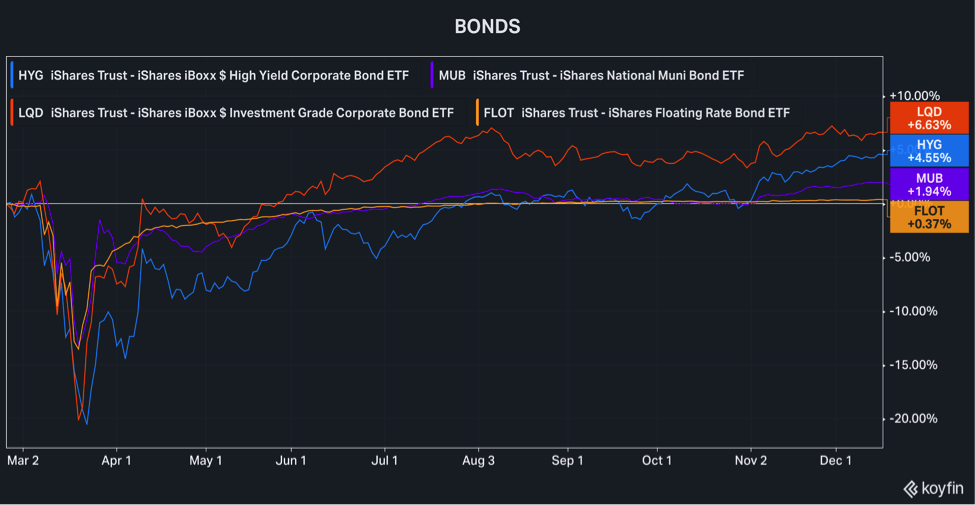As we turn the page on 2020, there are countless takeaways and lessons to be learned. We hope for better days ahead as 2020 was a challenging one for all. But before moving forward, we need to reflect on what transpired. When it comes to the markets and investing, I believe 2020 provided us with more lessons than the past decade. The important thing is we learn from these experiences and use them to our advantage moving forward.
Volatility
While it feels like a lifetime ago, the level of volatility in February and March still seems surreal. As the COVID-19 pandemic unfolded, the decline in equity markets was somewhat expected, but the sharp decline in the bond market was not normal and was scary at times.
It is extremely rare for bonds to experience double-digit declines in a calendar year. It’s so rare, in fact, it has happened only once in the last 40 years! Yet, in 2020, in the span of 30 days, several bonds indices plunged 10% to 20% with daily swings of 3%!
This speaks to the uncertainty and fragility of markets at the time. Thankfully, by late March, bonds started to recover and haven’t looked back since. Unsurprisingly, this recovery coincided when the Federal Reserve stepped in with the promise of unlimited stimulus.
Much of the same can be said for equities, albeit with a few extra blips of volatility along the way.
What does this tell us? Well, for one, markets tend to recover when things look their bleakest. A closer look at the unemployment rate helps paint the picture. As the unemployment rate was accelerating in both 2009 and 2020, markets were on the verge of monumental rallies.
Death of Buy-and-Hold?
Over the years, I’ve read countless articles about the death of the “buy and hold” strategy. But not only is it still alive, it’s thriving. To be clear, implementing certain tactical decisions can be beneficial, but sometimes the best strategy (also the hardest) is to make only minor changes.
To put matters in perspective, let’s take a look at the historical record:
Dating back to 1928, a 60% equity and 40% bond portfolio has earned ~7.7% per year.
The same 60/40 has averaged ~10.7% per year since 1970.
Over 20 years, from 1993 to 2013, the 60/40 portfolio earned ~8%/year, while studies showed that the average investor earned only ~2.5%/year.
Most investors would take these risk-adjusted returns, yet the average investor continually falls short. This tells us that far too many investors attempt to time markets—with consistently unsuccessful results. While it can be hard watching your portfolio fluctuate, it is almost universally advisable to stay the course and adjust your portfolio based on your true risk and not your emotions.
Headlines and Emotions
As I mentioned in another market commentary, investors react to headlines far too often. While it’s hard to ignore them, especially during a pandemic, it’s your best bet. Information travels so rapidly that by the time it’s a headline story, it’s often too late to act. Even the “best and the brightest” are often wrong, so assuming the headlines will give you a leg up is wishful thinking.
Did I expect the sort of market bounce back we have seen? No. But I have learned that short-term expectations are merely blind guesswork. To be fair, 2020 felt a bit different as we were battling a global health pandemic—but you can always depend on something else coming along, and when it does, it will be important to reflect back on what we learned from 2020.
Here’s to hoping 2021 brings much brighter days ahead!
Discuss your situation with a fee-only financial advisor.
The commentary on this website reflects the personal opinions, viewpoints and analyses of the Divergent Planning, LLC employees providing such comments, and should not be regarded as a description of advisory services provided by Divergent Planning, LLC or performance returns of any Divergent Planning, LLC Investments client. The views reflected in the commentary are subject to change at any time without notice. Nothing on this website constitutes investment advice, performance data or any recommendation that any particular security, portfolio of securities, transaction or investment strategy is suitable for any specific person. Any mention of a particular security and related performance data is not a recommendation to buy or sell that security. Divergent Planning, LLC manages its clients’ accounts using a variety of investment techniques and strategies, which are not necessarily discussed in the commentary. Investments in securities involve the risk of loss. Past performance is no guarantee of future results.
Divergent Planning, LLC provides links for your convenience to websites produced by other providers or industry related material. Accessing websites through links directs you away from our website. Divergent Planning, LLC is not responsible for errors or omissions in the material on third party websites, and does not necessarily approve of or endorse the information provided. Users who gain access to third party websites may be subject to the copyright and other restrictions on use imposed by those providers and assume responsibility and risk from use of those websites.
Divergent Planning, LLC is a Registered Investment Adviser. Advisory services are only offered to clients or prospective clients where Divergent Planning, LLC and its representatives are properly licensed or exempt from licensure. This website is solely for informational purposes. Past performance is no guarantee of future returns. Investing involves risk and possible loss of principal capital. No advice may be rendered by Divergent Planning, LLC unless a client service agreement is in place.
General Notice to Users: While we appreciate your comments and feedback, please be aware that any form of testimony from current or past clients about their experience with our firm on our website or social media platforms is strictly forbidden under current securities laws.
© Divergent Planning




